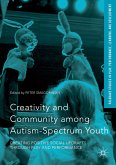Asperger's has never been clearly defined, bordering autism on one side and high intelligence and verbal eccentricity on the other. The disease is a kind of cultural lightning rod. First, it's a condition onto which we project the very real and well-founded fears of social isolation inherent in mental illness. But also attached to it is a kind of admiration and envy and (among those who suffer from Asperger's) a kind of elitism, a sense of being one of the elect, in a world mainly peopled by neurotypicals.
From the reviews:
"Osborne uses his considerable journalistic talents to interview a number of well-known ... and some not-so-well-known people diagnosed with an enigmatic disorder known as Asperger's Syndrome. ... Recommended for readers at all levels."
(K. M. Dillon, Choice Middletown, February, 2003)
"In the US, Asperger's Syndrome - a psychiatric disorder ... has become a rallying point for a diverse and often incompatible range of interests. While the UK isn't showing any signs of jumping on the Asperger's bandwagon ... books and articles on the subject makes it hard to ignore. Osborne's better than most because it takes the opposite tack, making the similarities between Asperger's sufferers and unaffected people bigger than the differences. ... This is an accessible book that's enjoyable and informative ... ."
(Emma Thomas, Focus, November, 2003)
"Osborne uses his considerable journalistic talents to interview a number of well-known ... and some not-so-well-known people diagnosed with an enigmatic disorder known as Asperger's Syndrome. ... Recommended for readers at all levels."
(K. M. Dillon, Choice Middletown, February, 2003)
"In the US, Asperger's Syndrome - a psychiatric disorder ... has become a rallying point for a diverse and often incompatible range of interests. While the UK isn't showing any signs of jumping on the Asperger's bandwagon ... books and articles on the subject makes it hard to ignore. Osborne's better than most because it takes the opposite tack, making the similarities between Asperger's sufferers and unaffected people bigger than the differences. ... This is an accessible book that's enjoyable and informative ... ."
(Emma Thomas, Focus, November, 2003)








